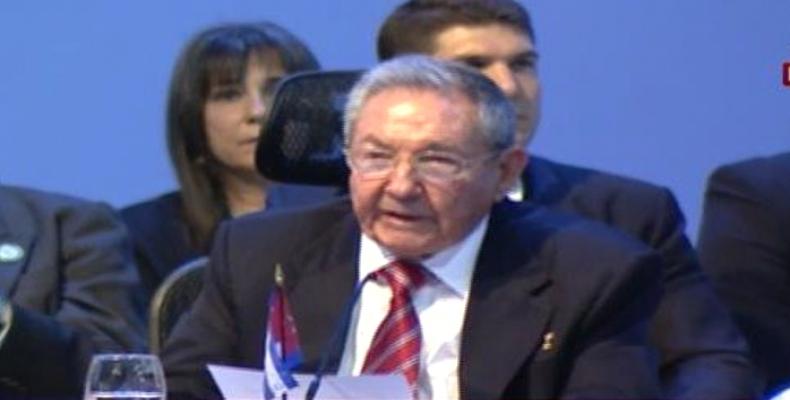San José, January 29 (PL-RHC)-- Cuban President Raúl Castro declared before the Third CELAC Summit that the normalization of relations between Cuba and the United States won't be possible as long as the U.S. economic, commercial and financial blockade imposed on Cuba exists.
The resumption of diplomatic relations is the beginning of a process towards the normalization of bilateral relations, but this will not be possible as long as the blockade exists, unless the the territory illegally occupied by the Guantanamo Naval Base is given back to Cuba, Radio Marti and TV Marti broadcasts stop and fair compensation is given to our people for human and economic losses, said Raul Castro.
In his speech at the Third Summit of the Community of Latin American and Caribbean States, the Cuban president also said it would not be ethical, just or acceptable to demand something from Cuba in exchange.
If these problems are not resolved, this diplomatic rapprochement between Cuba and the United States would be senseless, said the Cuban leader, in reference to talks held last week in Havana between representatives of the two nations. And the Cuban president said that no one should expect that Cuba will negotiate in exchange for our sovereign internal affairs.
The Cuban leader said that U.S. President Barack Obama could use his executive powers to substantially modify the implementation of the blockade, which is in his hands, even without a Congressional decision.
Raul Castro said the two countries were able to advance in their recent negotiations because "we treat each other with respect, as equals.” And he added: “It will have to be this way in order to continue advancing."
Regarding the talks, he said the results show that governments with profound differences can find a solution to problems through respectful dialogue and exchanges based on sovereign equality and reciprocity to benefit their respective nations.
"As I have repeatedly said, Cuba and the United States must learn the art of civilized coexistence based on respecting differences between both governments in cooperation on issues of mutual interest that contribute to the solution of challenges faced by the hemisphere and the world," said Raul Castro.
But he made clear that no one should hope that for that Cuba will have to give up its ideas of independence and social justice, give up in any of our principles or yield an inch in the defense of national sovereignty.
We will not let anyone provoke us, and we will never we accept any intention to advise us or put pressure on our internal affairs, he said, and added that we have earned this sovereign right with great sacrifices and at the price of the greatest risks.
He wondered if diplomatic relations can be restored without resuming financial services to the Interests Section of Cuba and its consular offices in Washington, which were cut off as a consequence of the U.S. blockade. Raul Castro also asked how diplomatic relations can be resumed without erasing Cuba from the list of nations that supposedly sponsor international terrorism.
He also wondered what would be from now on the behavior of U.S. diplomats in Havana regarding the observation of standards established by international conventions for diplomatic and consular relations.
The current situation modestly opens a window of opportunity to the hemisphere to find new, superior forms of cooperation to benefit the Americas, he said, and added that this would contribute to solve urgent problems and pave new ways.


